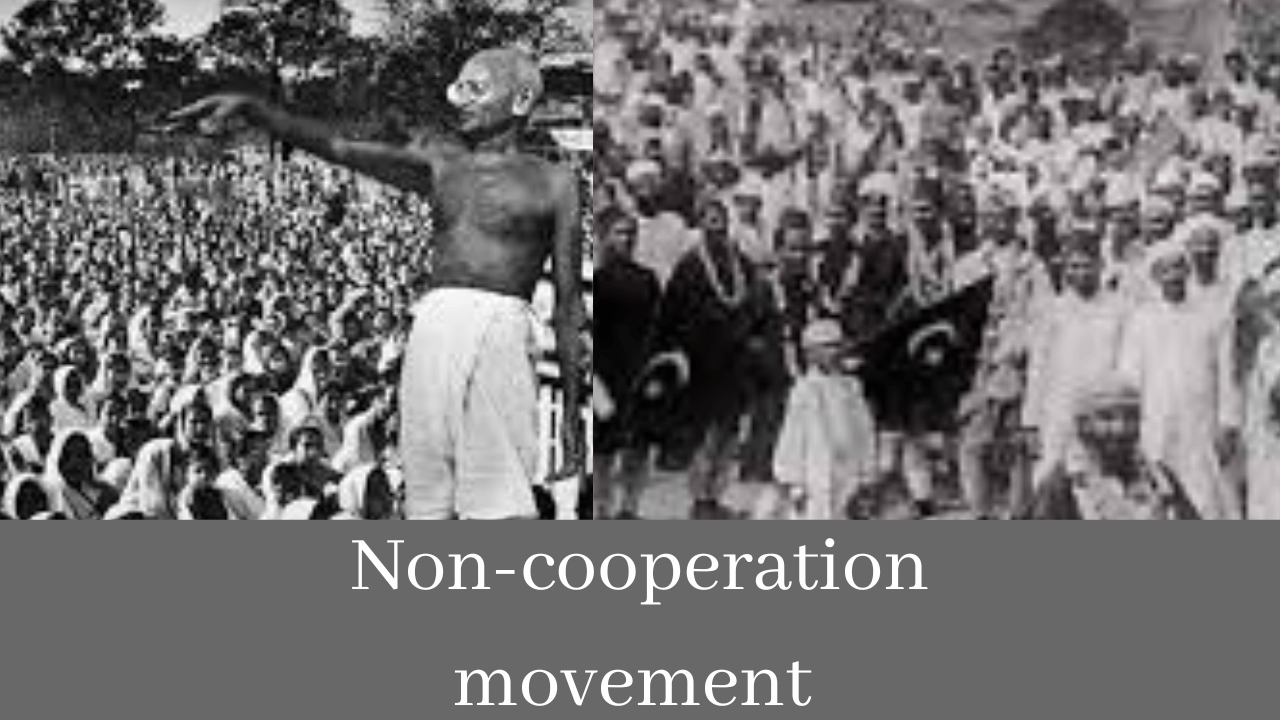The Non-Cooperation Movement of 1920–22 was a significant challenge to British rule in India initiated by Congress under the leadership of Mahatma Gandhi. It united people from all levels of society and religious backgrounds in a non-violent protest against British rule/British Raj.
It marked a significant turning point in India’s independence struggle and started as a result of events like the “Jallianwala Bagh Massacre.” The movement was called off in February 1922 following the Chauri Chaura incident. The article explores “the causes and significance of the Non-cooperation Movement. Further, it highlights the differences between the Non-cooperation Movement and the Civil Disobedience Movement.
The Non-cooperation Movement was a failed attempt by Gandhi to achieve self-government/self-rule for India from the British Raj through large-scale civil disobedience. It was a result of the heavy-handedness of the British government, including the passage of the Rowlatt Acts and the Amritsar massacre. The movement involved nonviolent acts like boycotting foreign goods, elections, and government institutions and refusing to pay taxes.
It was started in 1920 and was initially successful in shaking the British government. However, the movement was put to an end in 1922 after the killing of the police in Chauri Chaura as a result of violent outbreaks and a revolt by the Muslim Moplahs in Kerala. The movement signaled the shift in Indian nationalism from a middle-class to a mass basis.
Significance of Non-cooperation Movement
India’s Non-Cooperation Movement protested the British government in a non-violent way. Indians were requested to give up their titles, quit their government jobs, and withdraw their children from government-run schools. Besides refusing to join the British army and pay taxes, they were also instructed to boycott foreign products.
The Indian National Congress campaigned for Swarajya or self-government. The movement was significant because it was the first time Congress had demonstrated a willingness to forego constitutional means of achieving self-rule. Gandhi believed that if the movement was carried through to its end, Swarajya might be realized in a year.
The Non-cooperation Movement was a significant milestone in India’s independence struggle, which began in 1857 and continued until India’s independence in 1947. The movement marked a turning point in the Indian freedom struggle, as it was the first time that the masses had actively participated in the fight for independence. Here are some of the key reasons why the Non-cooperation Movement was essential in India’s independence struggle:
Mass Participation:
The Non-cooperation Movement was the first time that the masses actively participated in the freedom struggle. It gave the people of India a sense of ownership and agency in the fight for their rights and instilled a sense of pride and patriotism. It also marked a significant shift from the earlier, middle-class-led nationalist movements.
Civil Disobedience:
The Non-cooperation Movement was based on the principles of nonviolence and civil disobedience, which had a profound impact on India’s freedom struggle. These principles later formed the foundation for the Civil Disobedience Movement and other subsequent movements, which eventually led to India’s independence.
National Unity:
The Non-cooperation Movement brought together people from different regions, castes, and religions under one banner. It helped to create a sense of national unity, which was critical in India’s fight for independence.
International Attention:
The Non-cooperation Movement garnered international attention and support, which helped to put pressure on the British government. It was covered by the international press, and many international leaders, including Mahatma Gandhi‘s mentor, Gopal Krishna Gokhale, supported the movement.
Political Awakening:
The Non-cooperation Movement led to a political awakening among the people of India. It inspired them to become more politically aware and active, and many joined the Indian National Congress and other nationalist movements. It also gave rise to a new generation of leaders who went on to play a critical role in India’s independence struggle.
Causes of Non-cooperation Movement
Resentment toward the British after the war:
During the war, Indians felt resentment towards the British because they felt dissatisfied with the rulers despite their wartime support for the Government of India Act 1919.
Home Rule Movement:
The Home Rule Movement, which was led by Annie Besant and Bal Gangadhar Tilak, brought together INC extremists and moderates and established a basis for the Non-cooperation movement.
Economic hardship as a result of World War I:
India’s involvement in the war resulted in economic problems and inflation, which had an impact on the common man and farmers.
Rowlatt Act and the Jallianwala Bagh Massacre:
The repressive Rowlatt Act and the horrible massacre at Jallianwala Bagh, Amritsar, damaged trust in the British justice system and united the nation against the government.
Khilafat Movement:
The Khilafat Movement was started to convince the British government not to dismantle the caliphate, and it received Mahatma Gandhi’s backing to organize a joint protest against the British.”
Conclusion
The “Non-cooperation Movement was a significant event in India’s independence struggle, marking a turning point in the fight for self-rule against the British Raj.” The movement was based on the principles of nonviolence and civil disobedience and involved mass participation from people of all backgrounds. It helped to create a sense of national unity and political awareness and garnered international attention and support. Although the movement was ultimately called off following the Chauri Chaura incident, its impact on India’s independence struggle cannot be overstated.
The movement inspired future generations of Indian leaders and paved the way for subsequent movements that eventually led to India’s independence. The causes of the Non-cooperation Movement were rooted in British oppression, economic hardships, and religious issues, and the movement represented a united front against colonialism and injustice.




One Comment on “Non-cooperation Movement: Significance & Causes”